- Home
- Quizzes
- My Quiz Activity
- Newsletters
- Sports Betting
- MY FAVORITES
- Add Sports/Teams
- SPORTS
-
NFL
- NFL Home
- Arizona Cardinals
- Atlanta Falcons
- Baltimore Ravens
- Buffalo Bills
- Carolina Panthers
- Chicago Bears
- Cincinnati Bengals
- Cleveland Browns
- Dallas Cowboys
- Denver Broncos
- Detroit Lions
- Green Bay Packers
- Houston Texans
- Indianapolis Colts
- Jacksonville Jaguars
- Kansas City Chiefs
- Las Vegas Raiders
- Los Angeles Chargers
- Los Angeles Rams
- Miami Dolphins
- Minnesota Vikings
- New England Patriots
- New Orleans Saints
- New York Jets
- New York Giants
- Philadelphia Eagles
- Pittsburgh Steelers
- San Francisco 49ers
- Seattle Seahawks
- Tampa Bay Buccaneers
- Tennessee Titans
- Washington Commanders
-
MLB
- MLB Home
- Arizona Diamondbacks
- Atlanta Braves
- Baltimore Orioles
- Boston Red Sox
- Chicago White Sox
- Chicago Cubs
- Cincinnati Reds
- Cleveland Guardians
- Colorado Rockies
- Detroit Tigers
- Houston Astros
- Kansas City Royals
- Los Angeles Angels
- Los Angeles Dodgers
- Miami Marlins
- Milwaukee Brewers
- Minnesota Twins
- New York Yankees
- New York Mets
- Oakland Athletics
- Philadelphia Phillies
- Pittsburgh Pirates
- San Diego Padres
- San Francisco Giants
- Seattle Mariners
- St. Louis Cardinals
- Tampa Bay Rays
- Texas Rangers
- Toronto Blue Jays
- Washington Nationals
-
NBA
- NBA Home
- Atlanta Hawks
- Boston Celtics
- Brooklyn Nets
- Charlotte Hornets
- Chicago Bulls
- Cleveland Cavaliers
- Dallas Mavericks
- Denver Nuggets
- Detroit Pistons
- Golden State Warriors
- Houston Rockets
- Indiana Pacers
- Los Angeles Clippers
- Los Angeles Lakers
- Memphis Grizzlies
- Miami Heat
- Milwaukee Bucks
- Minnesota Timberwolves
- New Orleans Pelicans
- New York Knicks
- Oklahoma City Thunder
- Orlando Magic
- Philadelphia 76ers
- Phoenix Suns
- Portland Trail Blazers
- Sacramento Kings
- San Antonio Spurs
- Toronto Raptors
- Utah Jazz
- Washington Wizards
-
NHL
- NHL Home
- Anaheim Ducks
- Arizona Coyotes
- Boston Bruins
- Buffalo Sabres
- Calgary Flames
- Carolina Hurricanes
- Chicago Blackhawks
- Colorado Avalanche
- Columbus Blue Jackets
- Dallas Stars
- Detroit Red Wings
- Edmonton Oilers
- Florida Panthers
- Los Angeles Kings
- Minnesota Wild
- Montreal Canadiens
- Nashville Predators
- New Jersey Devils
- New York Islanders
- New York Rangers
- Ottawa Senators
- Philadelphia Flyers
- Pittsburgh Penguins
- San Jose Sharks
- Seattle Kraken
- St. Louis Blues
- Tampa Bay Lightning
- Toronto Maple Leafs
- Vancouver Canucks
- Vegas Golden Knights
- Washington Capitals
- Winnipeg Jets
- NCAAF
- NCAAM
- Boxing
- Entertainment
- Lifestyle
- Golf
- MMA
- Soccer
- Tennis
- Wrestling
- More Sports
- RESOURCES
- My Account
- YB on Facebook
- YB on Twitter
- YB on Flipboard
- Contact Us
- Privacy Policy
- Terms of Service
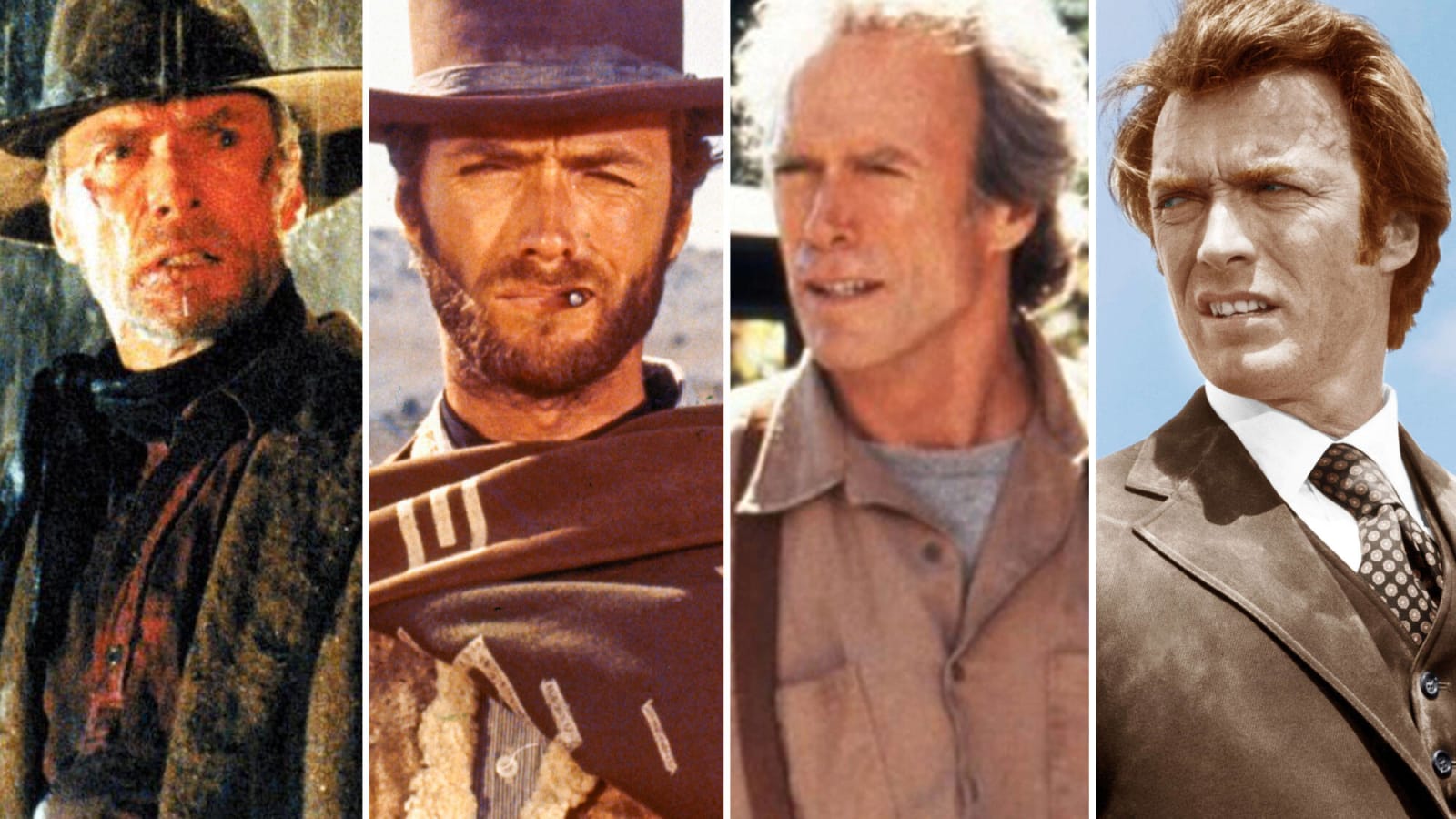
Simply put, Clint Eastwood is an icon and a larger-than-life character because of his work on the big screen. Of course, Eastwood has enjoyed an extremely successful career as a director, but he's also delivered some of the most memorable and legendary film roles.
We narrowed it down to the top 25. Here we go.
25. Gus Lobel, 'Trouble with the Curve' (2012)
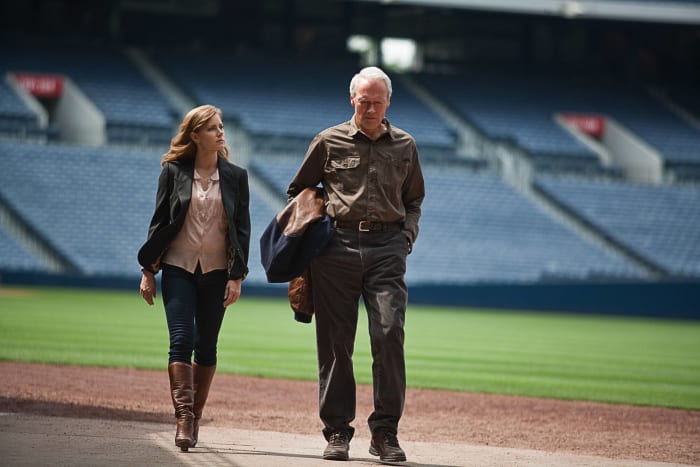
In Eastwood's first acting gig since 2008, he played an aging baseball scout for the Atlanta Braves in this underrated sports drama . It was a somewhat predictable tale about an older employee trying to cling to a job he was once really good at, but he might not always be willing to change with the times. That said, Eastwood's presence and chemistry with his on-screen daughter (Amy Adams) made the movie an underappreciated option if you're looking for an unassuming, casual Eastwood character that caters to just about any film fan.
24. Col. Francis D. "Frank" Corvin, 'Space Cowboys' (2000)

Even when Eastwood is surrounded by fellow Hollywood elite like Tommy Lee Jones, Donald Sutherland, and James Garner, he still stands out — in that classic Eastwood kind of way. And even within another predictable plot involving four retired test pilots thrust into space to prevent a Soviet satellite from hitting the Earth. Frank's tense interactions with Jones' William "Hawk" Hawkins, a former colleague and advisor, provided the film's best moments. It's not top-of-mind among Eastwood fans' favorites, but worth a watch to see that he can still command the screen with other stars in tow.
23. Thunderbolt, 'Thunderbolt and Lightfoot' (1973)

Clint can do comedy quite well from his turn in this early 1970s farce. If fans of the casual fan of Eastwood want to see some of his lighter work that works on various levels, this is the place to be. A notorious bank robber disguised as a minister and trying to make a getaway, Thunderbolt proved to be somewhat of a hell-raising mentor to the younger Lightfoot (Jeff Bridges). The movie is a smart comedy that also packs the right amount of drama and lends some likability to both co-stars.
22. John Wilson, 'White Hunter Black Heart' (1990)
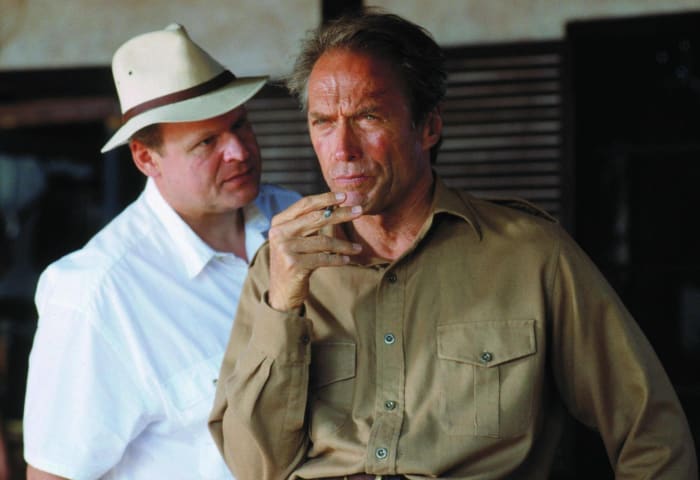
As we'll see, Eastwood is actually a more successful director than an actor when it comes to accolades and awards. With White Hunter Black Heart, the screen adaptation of the 1953 book of the same name by Peter Viertel. Eastwood casts himself in the lead role, based on legendary director John Huston, and the making of his 1951 movie The African Queen, one of the few at the time to be shot on location outside the United States. Wilson is there for work but also plans a hunting safari. Through Eastwood's direction and acting, the audience gets a pseudo-personal view of the kind of person he thought Huston to be.
21. John McBurney, 'The Beguiled' (1971)

As we'll see, Eastwood and famed director Don Siegel have enjoyed a successful working relationship. The Beguiled is the third of five films the two collaborated on and puts Eastwood at the forefront of a story about a wounded Union soldier who happens upon a Virginia school where the female students and staff take a fancy to him. Though appealing to the eye, John McBurney can be abrasive, manipulative, and ungrateful. While it may not be as popular as Eastwood's other movies with Siegel, it's quality Clint. Colin Farrell played McBurney in the 2017 re-work directed by Sofia Coppola and starring Nicole Kidman.
20. Earl Stone, 'The Mule' (2018)
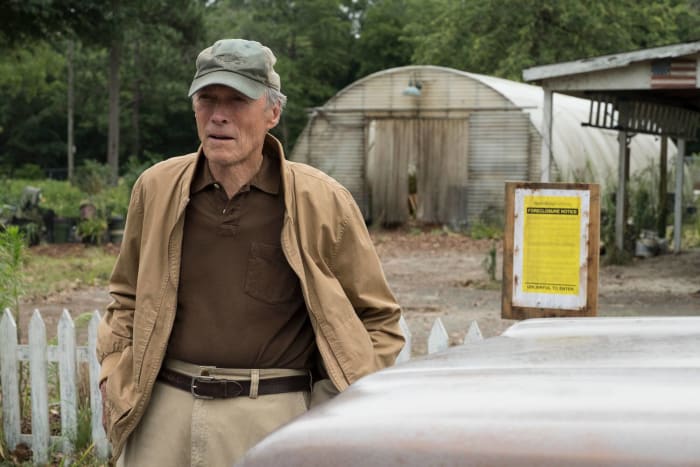
Based on the true story of Earl Sharp and one of the best recent movies Eastwood starred in and directed. The Mule doesn't tend to make many of these "Best of Eastwood" lists, but it's certainly worthy of our tastes. Stone, a proud Korean War veteran that has struggled to be a good family man, takes on the role of a drug mule transporting cocaine in the Midwest for a cartel in the wake of his business going bankrupt and losing his home. In many ways, Eastwood makes Stone a compassionate figure and relatively easy to root for, considering his circumstances.
19. Hogan, 'Two Mules for Sister Sara' (1970)
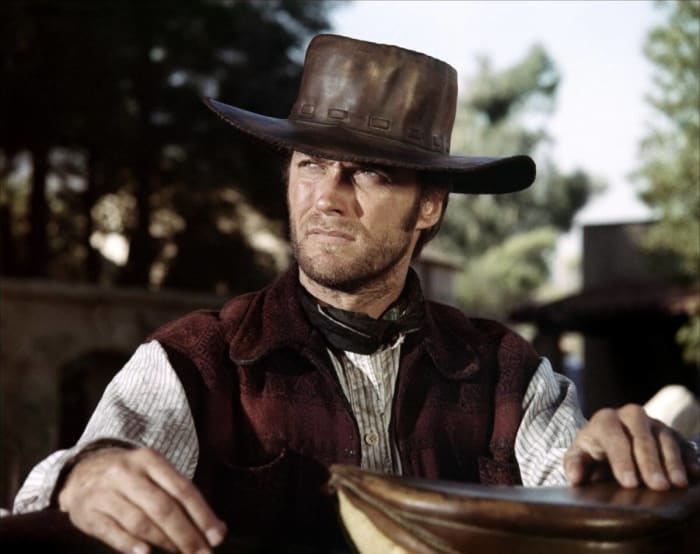
More from Eastwood and Don Siegel. Reviews for this American-Mexican Western were generally positive, though it's a bit tamer in comparison to his others films of the genre. However, Eastwood's Hogan is one of his most iconic Western characters. A stoic hero who gets a run for his money from Shirley MacLaine's Sara, a sex worker who poses as a nun while on the run. The chemistry between Eastwood and MacLaine makes the picture and shows that even the rugged and manly actor can share the limelight and remain notably successful.
18. Dave Garver, 'Play Misty for Me' (1971)
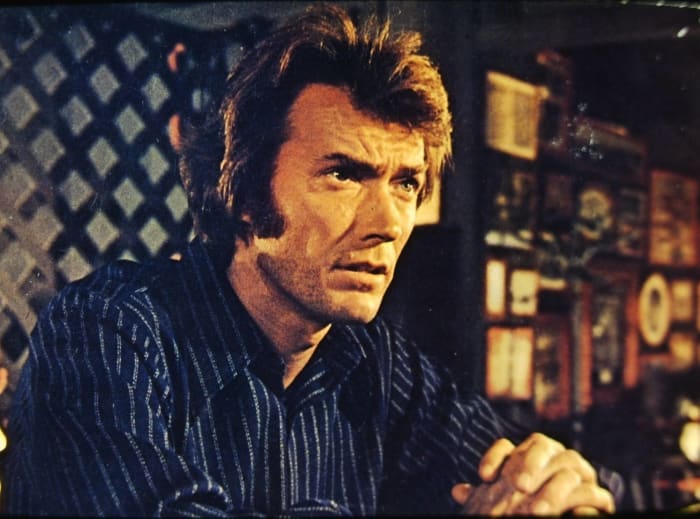
We go back to 1971 for Eastwood's directorial debut. And, of course, he cast himself in the lead role as a popular California disc jockey pursuing a romantic relationship with a fan (Jessica Walter), only to learn that she's obsessed with him to the point that his life is in danger. Now, Walter is the undisputed star of the film (earning a Golden Globe nomination), but Eastwood is no slouch in playing the victim of his psychological thriller that showed the star's versatility on screen and behind the scenes.
17. Red Stovall, 'Honkytonk Man' (1982)

Eastwood produced and directed this rather touching comedy-drama, which also stars his real-life son, Kyle (playing Red's nephew Whit in the film). Red is a sickly musician who finally gets his chance to play at the famed Grand Ole Opry before his imminent death. The story, however, is the adventure in getting there for Red and Whit, which considering their real-life relationship, makes the movie worth watching. Sure, it can be hokey and somewhat predictable, but Eastwood shines in a role that tends to be forgotten amid his acting arsenal.
16. The Preacher, 'Pale Rider' (1985)
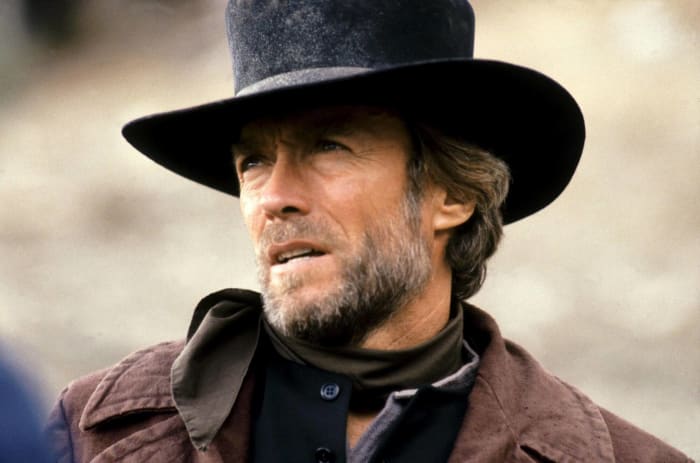
With a box-office gross of $41 million, Pale Rider remains the highest-grossing Western film of the 1980s. Eastwood again directs a picture that he also serves as its leading man. This mysterious man, known as The Preacher, is, according to Eastwood, a representation of Death when he's seen wearing a cleric's collar. An apocalyptic ghost, if one will. However, he serves helpful purposes in warding off a gang of thugs from terrorizing a mining town, but the mystery remains. It was good to see Eastwood return to his Western roots.
15. Philo Beddoe, 'Every Which Way but Loose' (1978); 'Any Which Way You Can' (1980)

We mentioned Eastwood's ability to shine in a comedy setting. Another sterling example is Every Which Way but Loose and its sequel, Any Which Way You Can. Critically, both movies were not highly looked upon, but commercially, they are among the highest-selling Eastwood movies. The first made more than $104 million, and the sequel took home nearly $71 million.
Philo Beddoe is a free-wheeling truck driver who moonlights as a bare-knuckle boxer and travels around with a pet orangutan named Clyde, maybe his most beloved co-star. At the time, the character was a questionable shift for Eastwood and well outside the box. But, if anybody could pull something like this off, it would be Clint.
14. Walt Kowalski, 'Gran Torino' (2008)
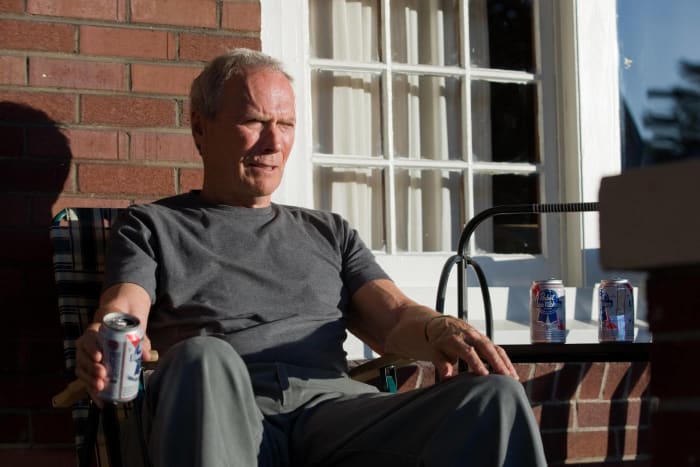
Eastwood directed his first starring role in four years, and it seemed like he didn't skip a beat. As Eastwood aged in real life, his characters took on a new form, with traits that weren't too pleasant. Walt Kowalski is a bitter, bigoted Korean War vet living in a suburban Detroit neighborhood that's become inhabited by southeast Asian immigrants (Hmong), several of which are in gangs, including his young neighbor, who tries to steal Walt's prized 1972 Ford Torino. Eventually, the two form a friendship. The boy owes his life to Walt, who can see good in people with whom he never felt worth associating. Consider it a successful acting revival for Eastwood.
13. Marshal Jed Cooper, 'Hang 'Em High' (1968)
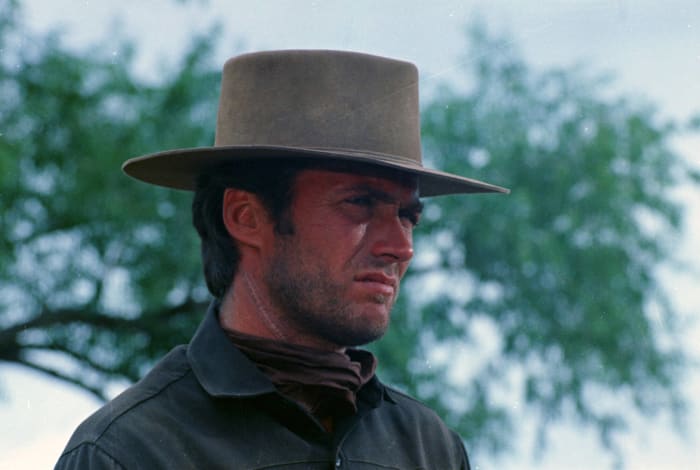
It's safe to say that 1968 was a pretty good year for Eastwood professionally. Three of his most popular and celebrated films were released that year, with Hang 'Em High as the first of the batch to come during the summer. A step up from the traditional, old-school Westerns that Eastwood made a name for himself, this movie sees Eastwood's Jed Cooper, an innocent man who survived a lynching, has a scar to show for it and eventually becomes a U.S. Marshal during the late 1880s. Then became a legend and sought vengeance on the man he tried to kill him. If that doesn't exude fictional cool, what does?
12. Walter Coogan, 'Coogan’s Bluff' (1968)

Eastwood's next classic to come out in 1968 was Coogan's Bluff, which is notable for being his first collaboration with aforementioned director Don Siegel. An Arizona deputy sheriff heads to New York City to extradite an escaped murderer. That's not someone you want to mess with, even if his surroundings might seem foreign. The character was also a glimpse of what was to come for Eastwood. He was set to move on, though not abandon, those Western film heroes who truly made him famous and branch out to different roles that showed his range as an actor.
11. Frank Horrigan, 'In the Line of Fire' (1993)
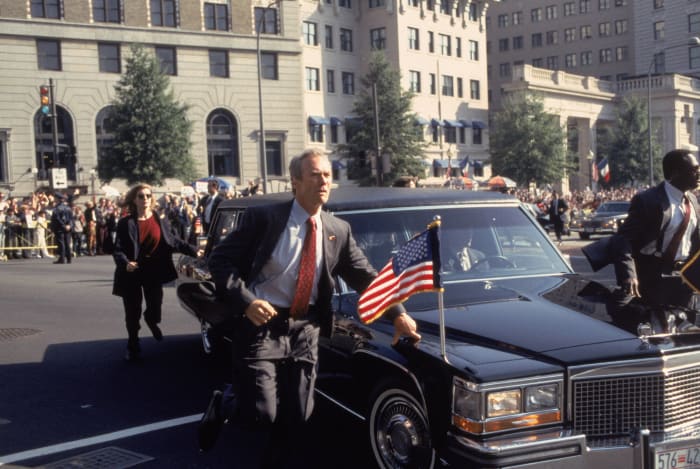
A popcorn political thriller that really doesn't seem to get the credit it deserves. It tends to get lost in the shuffle with Eastwood's more prominent pictures, especially those in which he pulls double duty as an actor and director. Frank Horrigan is an emotionally self-tortured secret service agent, the lone one still working who served on the detail for President John F. Kennedy when he was assassinated. Now, a disgruntled former CIA agent (brilliantly played by John Malkovich) plans to assassinate the current president and lets Horrigan know about it. Thus, turning the agent's life upside down while trying to stop that from happening. Riveting, intense, and Eastwood at his commercial best.
10. The Stranger, 'High Plains Drifter' (1973)
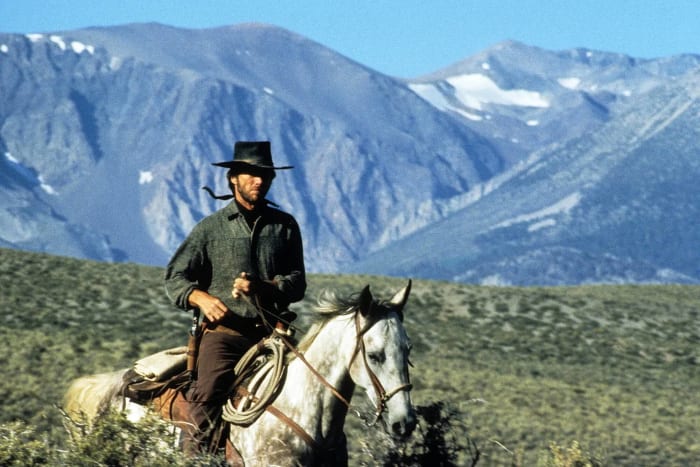
The first on this list to highlight the Western film genre that initially made him famous as a lead actor (more on that soon). In fact, High Plains Drifter was the first Western that Eastwood both directed and starred in. Building on his work with famed Spaghetti Western director Sergio Leone and the aforementioned Don Siegel, Eastwood doesn't necessarily veer from the formula that worked for him as an actor in these types of films during the 1960s. But, there's an edgier feel to "The Stranger," who becomes a hired gun to protect an Old West Mining town. The film proved Eastwood was still the top gun in the Western genre.
9. Gunnery Sergeant Tom Highway, 'Heartbreak Ridge' (1986)

In the mid-1980s, Eastwood introduced himself — as an actor and director — to a new generation of fans as the grizzled "Gunny" Highway in this popular military drama that's still a basic cable staple. In another past-his-prime role, Eastwood's Highway is a gung-ho jarhead fretting his approaching mandatory retirement from the United States Marine Corps. Yet, to any junior high or high schooler of the time, he was one of the coolest characters on the big screen. Highway is a hard-charging, hard-drinking, war-hero patriotic who spits out raunchy one-liners and quips at the drop of a hat. And we can't get enough. It's a shame this is not traditionally one of Eastwood's most celebrated roles.
8. Lt. Schafer, 'Where Eagles Dare' (1968)
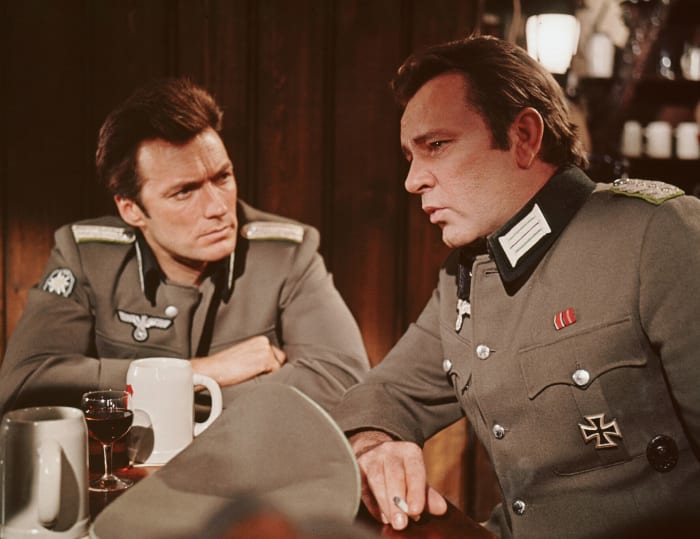
This just might be Eastwood's most grueling picture to complete. Then again, there were plenty of stunt doubles to help with this World War II-era picture. Eastwood teams with Richard Burton as members of an Allied paratrooper squad that raids a Nazi fortress. Eastwood taking on the Nazis; what's not to love? As war films go, Where Eagles Dare has long been considered among the classics, and Eastwood's performance showed he could excel in more than just Westerns. Perhaps the only thing better than the acting is the cinematography.
7. Robert Kincaid, 'The Bridges of Madison County' (1995)

Based on the massively popular novel, The Bridges of Madison County brought together two of Hollywood's elite: Clint Eastwood and Meryl Streep. Audiences should not have been surprised that Eastwood could pull off a romantic role as the charming National Geographic photographer who has a multi-day affair with the small-town Italian war bride (Streep). Even showing his softer side, Eastwood has an edge, and it was well-received and celebrated. However, only Streep earned an Academy Award nomination for her performance.
6. Josey Wales, 'The Outlaw Josey Wales' (1976)

We're entering the icons portions of this list. Another of Eastwood's early directing gigs, Josey Wales remains one of the most popular and celebrated Western characters in the history of modern cinema. It was a bold picture of sorts, highlighting a Missouri farmer during the Civil War who turned into a vigilante gunfighter after Union fighters murdered his family. When it comes to film outlaws — guys that never seem to die — Josey is actually easy to root on. After all, we tend to enjoy living vicariously through our big-screen heroes — good or bad.
5. Will Munny, 'Unforgiven' (1992)
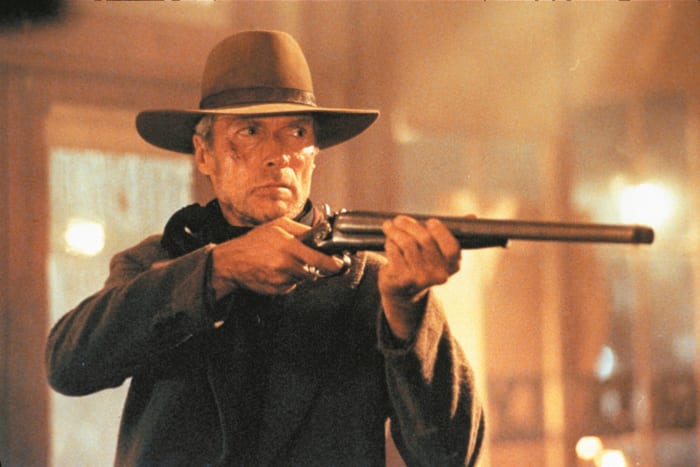
It's been noted by critics and entertainment writers that Unforgiven was the moment that elevated Eastwood, a legendary actor/director, to a legend worthy of Academy Award attention. This Western drama sees Eastwood's William Munny return to his outlaw ways to pull one more job amid his life as a law-abiding citizen. Munny's self-confliction makes for one entertaining character to watch and should be equally praised alongside Eastwood's lauded direction. Earning his first Oscar nominations Best Director and Best Actor, Eastwood won for the latter, while Unforgiven took home the award for Best Picture.
4. Frank Morris, 'Escape From Alcatraz' (1979)

Playing an infamous real-life character can be challenging for any actor, but Eastwood pulled it off without a hitch. In his fifth and final film with director Don Siegel, Eastwood is simply captivating as Frank Morris, the ringleader of the legendary 1962 prison break from Alcatraz. Trying to capture the authenticity of the real-life Morris, Eastwood was so good in the role that he's almost more associated with the prison break than the actual guys who pulled it off. Several professional critics and movie historians consider this one of the great prison films of all time.
3. The Man with No Name, 'A Fistful of Dollars' (1964); 'For a Few Dollars More' (1965); 'The Good, the Bad and the Ugly' (1966)
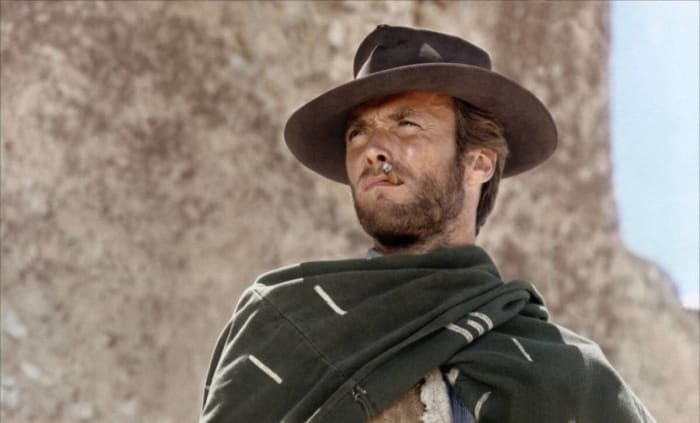
Considered an antihero by some but an icon in film history by all, "The Man with No Name" is one of the defining aspects of Eastwood's illustrious movie career. He's the star of Spaghetti Western director Sergio Leone's "Dollars Trilogy." Known for his poncho, brown hat, and chomping on cigarillos, he rarely speaks but is one of the most subtly menacing and intimidating characters in the history of Western films. It should also be said that the man actually has a name. He's referred to as "Joe" in A Fistful of Dollars, then "Manco" in For a Few Dollars More, and "Blondie" in The Good, the Bad and the Ugly.
2. Harry Callahan, 'Dirty Harry' (1971); 'Magnum Force' (1973); 'The Enforcer' (1976); 'Sudden Impact' (1983); 'The Dead Pool' (1988)
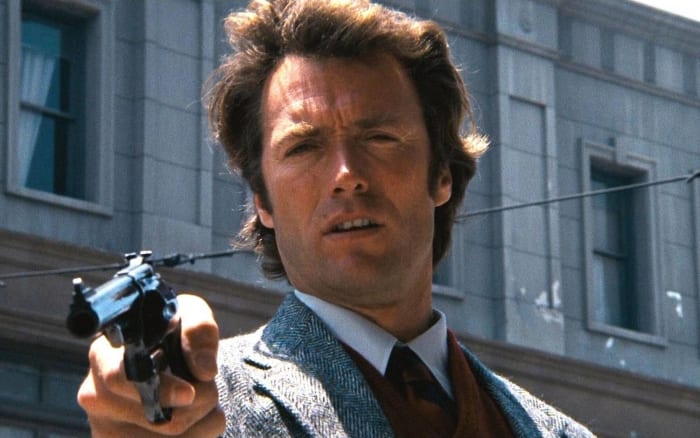
The .44 Magnum. The lines: "Go ahead, make my day" or "You've got to ask yourself one question: 'Do I feel lucky?' Well, do you, punk?" Need we say more about the ruthless San Francisco police inspector Harry Callahan, aka "Dirty Harry," after the name of the first movie, directed by Don Siegel, in a five-film series featuring the character? Harry likes to push boundaries when pursuing the bad guys, especially if incompetent police or government bureaucracy gets in the way. But Harry's status as an icon goes behind the big screen; it's a part of pop culture and American escapism. He has a life of his own, even bigger than the man who portrayed him.
1. Frankie Dunn, 'Million Dollar Baby' (2004)

It wasn't an easy path to this moment. Iconic characters like Harry Callahan or "The Man with No Name" have defined Eastwood's career for decades. However, when it comes to his most complete role, it sincerely begins and ends with Frankie Dunn. Eastwood won his second Best Director Oscar, and Million Dollar Baby claimed Best Picture. Eastwood's performance was a big reason for both, even while co-stars Hilary Swank and Morgan Freeman took home Academy Awards. Frankie is a curmudgeon of a man and a longtime boxing trainer. He reluctantly ends up training a female boxer (Swank) and embracing her like the daughter while he remains estranged from his biological one. It's Eastwood's most emotionally exhausting film — and character — but well worth the effort to experience.
A Chicago native, Jeff Mezydlo has professionally written about sports, entertainment and pop culture for nearly 30 years. If he could do it again, he'd attend Degrassi Junior High, Ampipe High and Grand Lakes University.
More must-reads:
Trending in Entertainment
Customize Your Newsletter
 +
+
Get the latest news and rumors, customized to your favorite sports and teams. Emailed daily. Always free!
Use of this website (including any and all parts and
components) constitutes your acceptance of these
Terms of Service and Privacy Policy.

